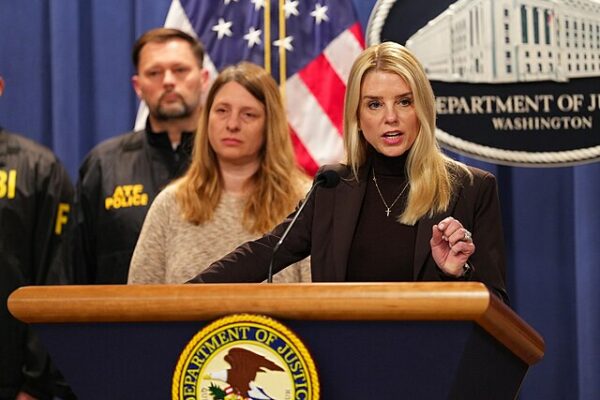
It’s an “admission of epic proportions,” according to a researcher. Health Canada, the department of the Government of Canada responsible for national health policy, earlier in the week announced that it found the presence of DNA in the Pfizer COVID-19 vaccine that some believe to be cancer causing. The alleged discovery includes the Simian Virus 40 (SV40), a promoter and enhancer that was not disclosed by Pfizer previously.
“The polyomavirus simian virus 40 (SV40) is a known oncogenic DNA virus which induces primary brain and bone cancers, malignant mesothelioma, and lymphomas in laboratory animals,” according to studies published by the National Institute of Health.
The accusations of the existence of SV40 in the COVID-19 vaccines has been disputed by various health institutions in the United States. The Children’s Hospital of Philadelphia, for example, wrote that SV40 has not been present in any vaccine since 1963.”
“Health Canada expects sponsors to identify any biologically functional DNA sequences within a plasmid (such as an SV40 enhancer) at the time of submission,” the agency said in an email to The Epoch Times.
“Although the full DNA sequence of the Pfizer plasmid was provided at the time of initial filing, the sponsor did not specifically identify the SV40 sequence.”
The regulator said that after scientists Kevin McKernan and Dr. Phillip J. Buckhaults publicly raised the presence of SV40 enhancers in the vaccines earlier this year, “it was possible for Health Canada to confirm the presence of the enhancer based on the plasmid DNA sequence submitted by Pfizer against the published SV40 enhancer sequence.”
Both scientists have made waves after discovering plasmid DNA in the mRNA COVID-19 injections, warning it could potentially alter the human genome. However, the two share different degrees of concern about the significance of an SV40 sequence—which is used as an enhancer to drive gene transcription during the vaccine manufacturing process—being present in the shots.
Mr. McKernan, a former researcher and team leader for the Massachusetts Institute of Technology Human Genome Project, told The Epoch Times he suspects Pfizer didn’t disclose the presence of the DNA sequence due to the association of SV40 with polio vaccines. He said while there is no evidence the sequence is carcinogenic, he has concerns about its integration into the human genome.
Simian Virus 40 (SV40) is not commonly used in vaccines today, but its historical relevance in vaccine development and research cannot be overlooked. SV40 was first discovered in rhesus monkey kidney cells in the 1960s and was unintentionally introduced into some early polio vaccines. During this period, it was a crucial tool for the production of polio vaccines, as it helped to culture the poliovirus. However, the presence of SV40 in these vaccines raised concerns about potential health risks, leading to its eventual removal from polio vaccines in 1963.
In more recent years, SV40 has been studied for its potential as a viral vector in vaccine development. Viral vectors are modified viruses that can carry genetic material from other pathogens, helping to stimulate an immune response against those pathogens. Some scientists have explored the use of SV40 as a viral vector to deliver antigens from various infectious agents. This research has shown promise in preclinical studies and represents a potentially innovative approach to vaccine development, but it remains an area of ongoing investigation to ensure the safety and effectiveness of such vaccines.
Although the Simian Virus 40 has been used historically in the production of early polio vaccines, its presence raised safety concerns and led to its removal from vaccine formulations. Today, SV40 is being explored as a possible viral vector in vaccine research, although its use in this context is still in the experimental stage and subject to rigorous evaluation to ensure its safety and efficacy in modern vaccine development.
“Health Canada expects sponsors to identify any biologically functional DNA sequences within a plasmid (such as an SV40 enhancer) at the time of submission,” Health Canada statement read. “The manufacturer failed to disclose the existence of the SV40 sequence in the DNA sequence of the shot. Although the full DNA sequence of the Pfizer plasmid was provided at the time of initial filing, the sponsor did not specifically identify the SV40 sequence.”
For those of you asking for a source for the SV40 sequence claim, Health Canada emailed us this response to our question on July 28, 2023. pic.twitter.com/E9vo0QtIDc
— Matthew Horwood (@Matt_HorwoodET) October 19, 2023
According to the regulator, the presence of SV40 enhancers in the vaccines was confirmed by Health Canada after scientists Kevin McKernan and Dr. Phillip J. Buckhaults pointed it out. They had expressed concern regarding the potential risk of plasmid DNA contaminations causing changes in the human genome. However, the scientists did not suggest any wrongdoing on Pfizer’s part.
American regulators have been less willing to claim that the “monkey virus” was included in the vaccine.
In June, The Associated Press provided a fact check, writing that public health officials researchers typically cited in social media posts have contended that Simian 40 does not exist in the jab approved in the United States. “Some COVID-19 vaccines utilize DNA molecules derived from Simian Virus 40, but that’s not the same as the virus itself and the molecules aren’t cancer-causing.”
Spokespersons for the Centers for Disease Control and Prevention and the U.S. Food and Drug Administration told the AP that the ingredients of approved vaccinations are explained on its website.
“There is no evidence to indicate the presence of SV40, a virus found in monkey kidneys that can potentially cause cancer in humans, in the formulation of COVID-19 vaccines,” wrote Alessandro Faia, a spokesperson for the European Medicines Agency, the Netherlands-based European Union agency that regulates pharmaceuticals, in an email.
Pfizer also confirmed to the outlet that no monkey DNA was used in the creation of its version of the COVID-19 inoculation.
“The vaccine is a completely synthetic vaccine,” the company wrote. “There were preclinical animal challenge studies utilizing rhesus macaques; however, no part of our vaccine or studies utilized green monkeys. The claim that the vaccine includes monkey DNA is inaccurate.”
Dr. Janci Lindsay, the director of toxicology and molecular biology for Toxicology Support Services challenged Pfizer’s statements, claiming that they failed to disclose the SV40 promoter to regulators in the United States, Canada, and Europe,
“They hid them. So it’s not just the fact that they’re there, it’s the fact that they were purposefully hidden from the regulators,” she told The Epoch Times.
The World Health Organization has stated, “Healthcare professionals and public health authorities have a central role in discussing vaccination against COVID-19 with their patients. Vaccines play a critical role in preventing deaths, and hospitalisation caused by infectious diseases, and are contributing to controlling the spread of the disease, thus their impact on infection and serious illness is significant. Both vaccinated and unvaccinated people also need to be aware of the additional protective behaviours required to control the pandemic locally.
The global impact of the COVID-19 pandemic has resulted in an unprecedented level of public interest in vaccines. This includes a focus on the development of vaccines and their regulatory review and safety monitoring. Much of this coverage has taken place through mass and social media. Reports of adverse events (side effects) have led some people to express concerns about getting vaccinated, delay getting vaccinated or be strongly opposed to vaccination. There are also differences in individual confidence in national safety monitoring systems….Clear and consistent communication of evidence and uncertainties is therefore essential to support people in making the critical choice to be vaccinated.”
It sounds like public health officials in the United States and Canada may soon need to have a conference call.
[Read More: The Biggest Fraud Ever Against The United States]











